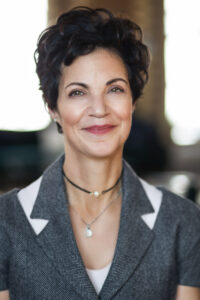This is the eleventh post in a new series of perspectives from some of Publishing’s leaders across the non-profit and profit sectors of our industry. How did these leaders get into publishing? What excites them? What is their vision for the future of publishing, and indeed for the business and careers of all those working at their organization? We rarely gain these insights so we are excited to give voice to some of the key leaders in the academic publishing world.
Today, we talk to Annie Callanan, Chief Executive of Taylor & Francis.
 What was your route into publishing? Could you tell our readers a little about what drives you as a leader of Taylor & Francis?
What was your route into publishing? Could you tell our readers a little about what drives you as a leader of Taylor & Francis?
While not a lifetime publisher, I’ve worked extensively in the knowledge and information sector prior to joining Taylor & Francis.
I started my career on Wall Street, in an M&A firm that, as it happened, became an early adopter and pioneer in the development of database technologies used to track competitive deal flow. As a by-product of this capability, the firm became a large data subscription vendor and publisher, with an expanding focus on the strategic application of technology on Wall Street.
This early exposure greatly influenced my understanding of digital publishing as well as the power of applied technologies to advance business value. Subsequently throughout my career I became most passionate about opportunities that leveraged data, technology, and human judgement to solve real world problems and improve lives. For instance, it was this passion that led me to previous leadership roles at various companies within the wider publishing ecosystem, where I saw how technology could catalyze knowledge and maximize its impact, by helping to connect people to information.
I also spent time within the health sector, where similarly, I was continuously inspired by the ways in which the power of data and technology could be harnessed to improve health and safety outcomes for citizens. All of this eventually led me to Taylor & Francis in 2017, where I am proud to be the leader of a company united around a shared purpose: to foster human progress through knowledge.
We have such an incredible opportunity as academic publishers to promote science while championing humanity, so that the knowledge generated by the world’s greatest minds can be used to benefit our entire human community.
Like every colleague at T&F, I am driven by this opportunity to make a tangible, lasting positive difference through my work. And as its CEO, I look forward to leading T&F into a new era of publishing – an era in which technology will empower and enable publishers to better perform our vital duties of curating, cultivating, and substantiating evidence-based truths, and transforming these truths into applied knowledge that propels human-centered progress.
As a leader in academic publishing, what most excites you right now?
We are all fortunate to be living in a time where we have access to such an abundance of knowledge. However, this also means that we are originating knowledge at such an accelerating rate that synthesizing and applying it has proven to be a growing challenge. What really excites me is thinking about how technology can be applied to solve this problem, so that the unprecedented amount of knowledge available can have an equally unprecedented impact on the sustainable progression of our shared human experience, instead of sitting disconnected on servers and shelves around the world.
Part of the solution requires the academic publishing industry to collectively consider how we can shape a more fit-for-purpose, modern knowledge system – one in which individual, discrete fragments of scientific knowledge can be relationally connected to form composite wisdom that can be applied to solve complex problems. Technologies like AI will play a huge role in helping us progress, by enabling faster identification of those connections which can shape smarter and more rapid application. I truly look forward to contributing towards the architecture of ‘next gen’ knowledge systems that place greater emphasis on improving collective wellbeing, facilitating sustainable and equitable social and environmental constructs, and enabling people all over the world to achieve their full potential.
How is T&F positioned to serve the next generation of students, researchers and professionals?
At T&F, we believe it is in our service to knowledge makers and the knowledge communities they affiliate with that we find our highest purpose as publishers. As a result, everything from our current strategy to our future vision is naturally shaped by the brilliant minds who are originating new knowledge. We are constantly looking to adapt our capabilities, service models, and value preferences to suit their changing needs. My aspiration is that our services are always evolving to add value and impact at every stage in a knowledge maker’s career, both now and in the future.
Of course, this is much easier said than done, but I am always inspired by the passion, dedication, talent, and expertise shown by T&F’s 2,650 colleagues each day, and I am confident in our ability to continue delivering on this commitment.
What do you anticipate the major challenges will be for T&F, and indeed the publishing industry, over the next five years?
In 2019, I gave a speech at the STM Conference in Frankfurt, reflecting on what I perceived to be the key issues dominating the knowledge economy at the time: the implications of a post-modern world where knowledge and truth are increasingly hard to disentangle from opinion and fake news. Unfortunately, this threat is even more acute today. Combatting misinformation and promoting shared, substantiated, evidence-based truths will be a key challenge for all of us in the publishing industry for many years to come, particularly with the advent of greater proliferation and use of generative AI models. But as a collective, we can do this by responsibly enabling a purposeful, dynamic and human-centered approach to the curation, cultivation and authentication of evidence-based knowledge, and by leveraging both applied technologies and unsurpassed, diverse human judgement to all our endeavors.
What does open access (OA) mean for your business?
The whole point of our collective knowledge quest is to find the answers that will help us guide and govern a more enriched and sustainable human experience, for all global citizens in equal measure. This is an incredibly ambitious undertaking, so we must ensure an equal playing field of access for all sound science. Irrespective of geography, language, discipline or funding source, all knowledge makers must be given the opportunity to contribute; and their contributions must be shared with greater speed and made discoverable for maximum impact. With this in mind, Open Research will continue to play an important role in allowing T&F to deliver on our promise of fostering human progress through knowledge.
We are committed to enabling sustainable open initiatives that lead to more open data and evidence-based outputs, and to finding an appropriate funding option for any sound science research that is submitted to us. We have over 300 dedicated OA journals, and more than 95% of our journals offer a path to publishing OA. We also welcomed F1000 into our family in 2020 to help accelerate our commitment to open research. F1000’s trailblazing publishing model combines the benefits of pre-printing (providing rapid publication) with mechanisms to assure quality and transparency (invited and open peer review, archiving and indexing).
Moving forward, we are committed to working collaboratively and creatively with funders, institutions, researchers, our publishing peers, and policymakers to drive a sustainable shift towards open research models that benefit the entire scholarly ecosystem.
What publishing innovations are you most proud of?
Earlier, I mentioned how excited I was to see the ways in which innovations like artificial intelligence will enable us to extract learnings out of research faster and more effectively. But while innovation will drive our future, our present value is largely derived from the flexibility and quality of our services.
I also mentioned earlier the huge changes we are currently seeing in our external environments and in our customers’ preferences and needs. So, while innovations in authentication, validation, synthesis, dissemination, and application can be anticipated, we must focus on continuing to elevate our offerings to remain a best-in-class service to our customers throughout this period of constant change.
What is the future of hybrid/remote working at T&F?
The pandemic fundamentally changed the way we work, and as a result, we adapted our approach to hybrid/remote working, guided by the preferences expressed by T&F colleagues all around the world. That’s why in 2021, we launched our Balanced Working Policy, to reflect our belief that there is a balance to be struck through a blend of home and office working that provides greater flexibility for colleagues whilst maximizing benefits for the business. With Balanced Working, T&F colleagues are given the ability to divide their working time between home for solo work and a T&F office for collaborative face-to-face meetings and teamwork.
On a personal level, I am so pleased by how this policy enables a wider range of colleagues to realize their potential at T&F, and I’m confident that this is the way forward towards promoting a more diverse, inclusive workplace.
What do the next generation of academic publishing jobs look like to you?
It all goes back to those next gen knowledge systems I mentioned, which will require the next generation of academic publishing professionals to be actively engaged in synthesizing and connecting disparate truths from a multitude of disciplines and knowledge makers. It’s not enough for us to have simply transferred knowledge from shelves to servers – the next generation of publishing must involve working towards greater practical application.
A best-in-class knowledge system for this century will be architected on a foundation of data rather than words, so understanding how to leverage data will be a critical skill in working towards this goal.
At T&F, our next decade of progress will be equally purpose-driven and anchored around human-centered science, enabling our publishing professionals to champion humanity by ensuring that a human perspective is incorporated into each facet of scientific discovery we curate and commission, because science for science’s sake is increasingly falling short on delivering the sustainable well-being the world so desperately needs.
If we can do these three things – connect disparate truths, effectively leverage data, and return humanity to the epicenter of science – then the next generation of academic publishing jobs will succeed in achieving our industry’s highest purpose.

